Alan Goldberg (aka Dr G) is a sports psychology coach that shares a lot of helpful tips and resources through his YouTube and social media channels (Instagram, Facebook, Twitter). He has a lot of experience in multiple sports, including target athletes like us pistol shooters, and a didactic passion that transcends his videos and texts. He’s published at least 15 books that you can find on Amazon, among which are Sports Slump Busting and This is your brain on sports (Amazon affiliate links)
If you are following my mental training for ISSF pistol shooters playlist you have already seen some of his videos and understand why I felt compelled to reach out and ask for an interview. Alan responded quickly and provided a lot of great answers. Here’s the video and the edited transcription plus a selection of videos from Dr G. There’s a lot of insight here!
Table of Contents
How and when did you get into sports psychology and mental training of athletes?
I was a tennis player growing up and as I got more competitive one of the things that I was sort of fascinated by was that it wasn’t the best player physically that won, it was the best player mentally, which I didn’t know much about then, about being able to handle pressure, being able to deal with your mistakes and your frustration… I wasn’t a strong tennis player but I would beat much stronger players than me because they would get upset, they would get frustrated, they would get angry with themselves, and I used to feed on that.
So that was one direction that moved me closer to sports psychology and then the other one was that I taught tennis professionally for 22 years and over the course of my teaching I also saw the effect that people’s focus, anxiety level and self-image had. That got me more and more interested in this side of sports. When I started my doctoral work in counseling psychology there weren’t a lot of sports psychology programs so I got a degree in counseling psychology, but my heart was really in sports.
After I got my degree I just started experimenting and networking with other people who were doing it. There weren’t a lot of people in the field when I first started, so it was based on my own experiences as an athlete.
And then one other thing, when I played number one singles at my college there was a guy who was better than me, who came in as a freshman. He played number six as a freshman, I played number. Same thing, he was always three or four places behind me because he would get so upset when he made mistakes and he’d get so nervous under pressure that he couldn’t use his skills, they would just disappear, which is what happens when as athletes we focus on the wrong things or get too anxious. If our nervous systems revs up, our skills leave, they go away.
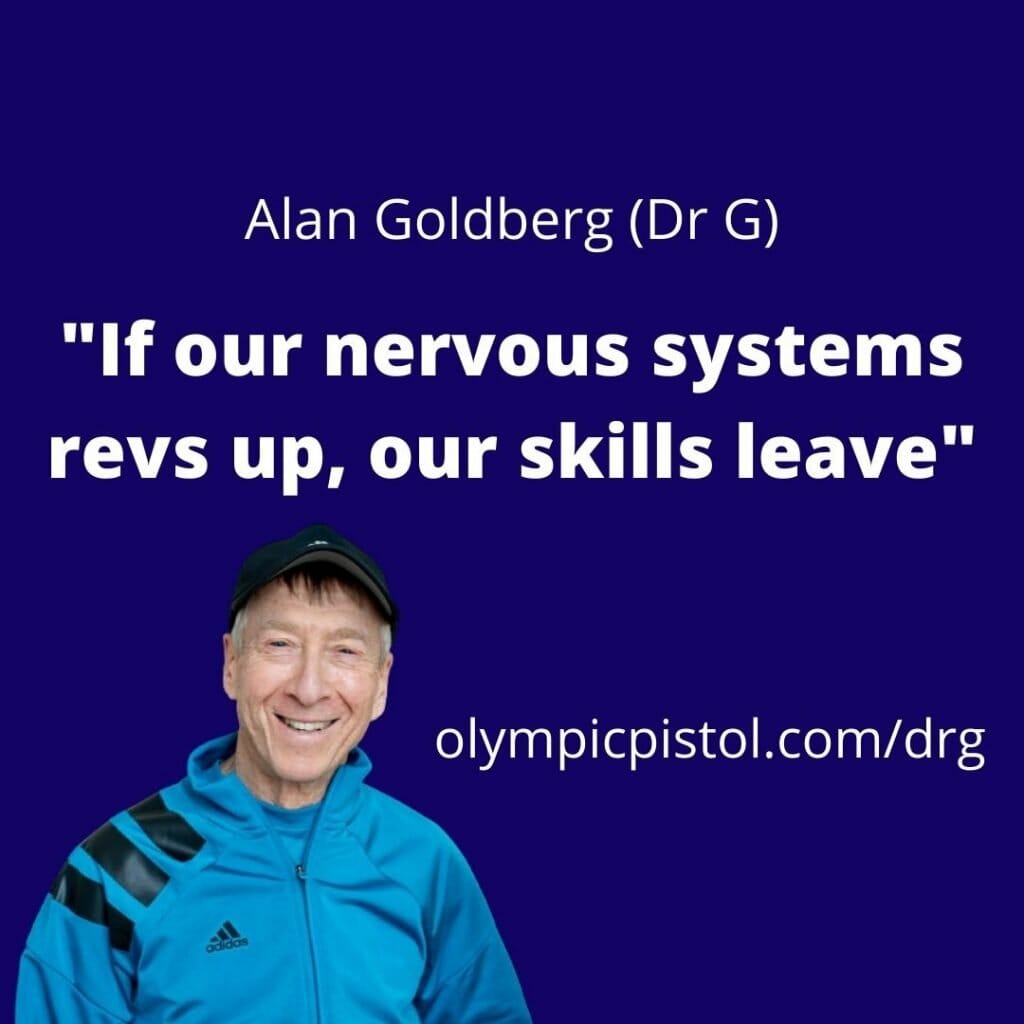
What’s your experience with pistol athletes? Is it different from other athletes? What do they have in common?
All sports have a lot of things in common, like being under pressure and having to focus on the right things, and you have to be able to deal with mistakes.
The thing with any kind of target sports is that it’s much more of a fine motor sport and it’s much more susceptible to the wrong kind of thinking, or to too much activation, or too much nervousness, or frustration. So because it’s a fine motorsport it actually makes the mental side that much more important.
One of the key things in any target sport, and especially in pistol and rifle, is making sure you keep your concentration on what you’re doing and not on what you’re thinking. Too many of us athletes get into our heads and when we do that we dissociate, we leave our body. If you’re thinking too much- if you’re worried about score, if you’re worried about your place in the competition or about mistakes you’ve made- what happens is that you’re no longer in your body and you lose feel.
Pistol and rifle shooting are all about the feel of what you’re doing and thinking distracts us from that and then causes a lot of performance problems as a result.
So I think that the thing that distinguishes your sport is really that fine motor aspect of it.
What are you most proud of in your coaching career?
I’m kind of a continuous learner and I think the thing that I’m the most proud of is that I’m always looking for better ways of doing things. I’m always suspicious of experts, of people who have all the answers.
I’ve been doing this work for about 35 years and for the first 17 I did what most people in the field do, which is to work on the surface, teaching positive thinking, concentration, techniques for staying calm under pressure… all of that stuff. Those are useful skills for any athlete to have in their mental toughness toolbox. My specialty early on and as it is today is working with people who have specific repetitive performance problems: somebody who chokes under pressure, someone who’s in a slump, someone who at certain competitions (at the bigger competitions) doesn’t do well… That’s always been my specialty, and one of the things that I discovered after 17 years of doing it the more traditional way was that there were certain athletes I couldn’t help. They’d have a little bit of improvement but then they would fall back to their problems.
I knew I was missing something, so I went looking for other ways of working and I’ve gone outside the field of sports psychology a lot to learn what I know. I also started networking with other people who were doing more interesting things, and I ran into David Grand, who was a trauma therapist and believed that behind any kind of performance problem the athlete had some kind of trauma. When I say trauma I don’t mean capital T trauma. It could be being humiliated, it could be failing in a big pressured situation, it can be an injury, and it can also be upsetting events that happen that have nothing to do with your sport. I found David and I really liked what he had to say, so what I did was I started working with him individually, I started doing consultation with him. He and I then wrote a book (Amazon affiliate link) and that’s how I learned. I learned by kind of immersing myself in other areas, and that really changed the nature of my work.
I like that I’m curious and despite the fact that I’ve been doing this a long time, and I’m very good at what I do, there’s a lot I don’t know and I’m always looking for new approaches.
What is mental toughness?
Mental toughness to me is like an umbrella of skills: staying calm under pressure is an aspect of mental toughness; being able to focus on what’s important and let go of everything else is an aspect of mental toughness; your confidence level, how you handle mistakes and failure is a product of your mental toughness; being able to avoid getting psyched out or intimidated is part of mental toughness; being able to handle last minute negative thinking and doubts, which we all have, that’s a product of mental toughness. The foundation skill that affects mental toughness is concentration, because it generalizes over a lot of areas. What you focus on before or during a match is going to affect how nervous or how calm you are, it’s going to affect your confidence level, it’s going to affect how you handle your mistakes and whether you’re able to let go of them. To me, at least with the surface skills, concentration is probably the key skill in this and in any sport, but certainly when talking about mental toughness.
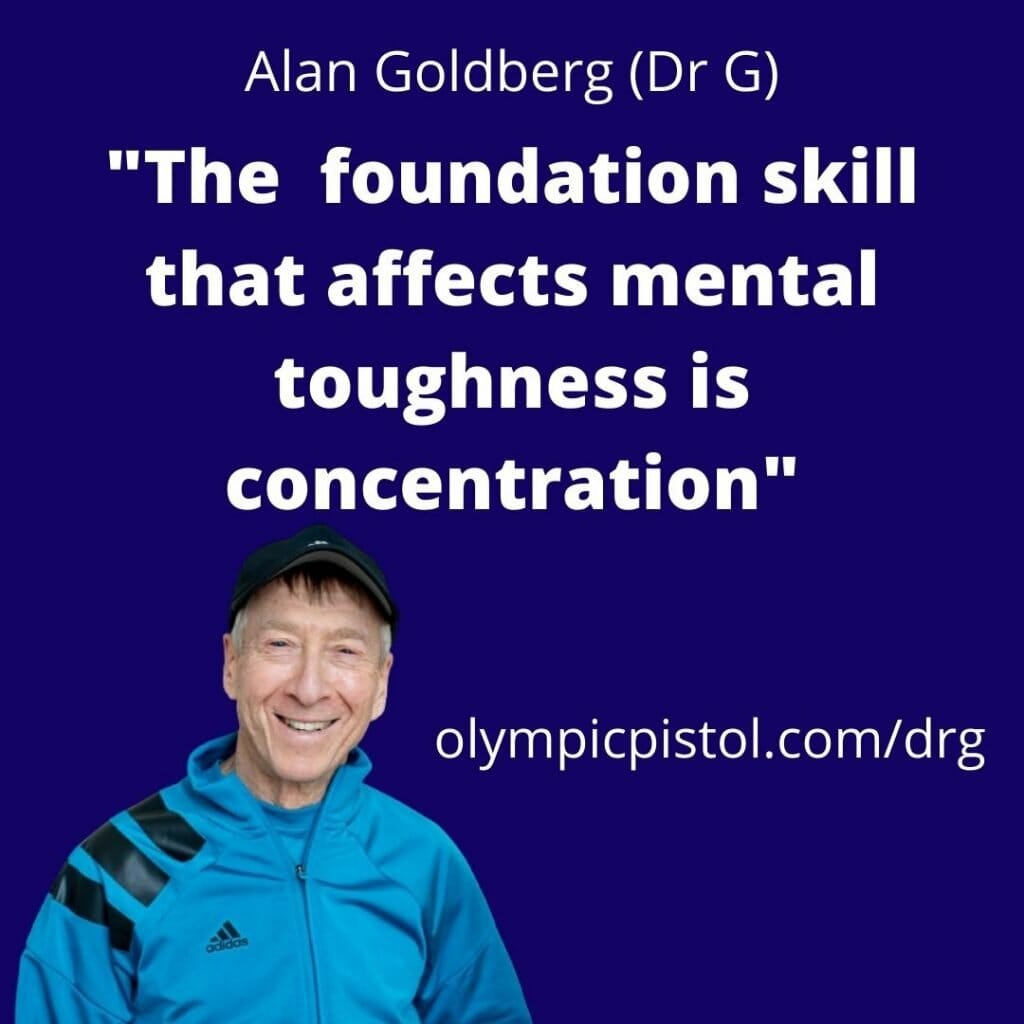
What is your coaching philosophy and style like?
When I work with people I take them through a specific process. I look at the mental side as a training area. A lot of people think sports psychology is for people who have problems, mental problems. You know, psychologists work with crazy people and sports psychologists work with crazy athletes. That’s just that’s a neanderthal way of looking at the mental side every sport has. You know the importance of the mental side.
You know Mark Spitz, the Olympic swimmer from the Munich Olympics years ago? I interviewed him and he said this quote that I think generalizes to every sport: getting good and swimming in practice is 90% physical and 5-10% mental. In order to get good you have to work on your craft, you have to practice, you have to have good skills. Then he said: when you go to compete it’s 90% mental and 10% physical. But actually, as far as I’m concerned, he was wrong: when you go to compete it’s all mental, because what you focus on, your ability to stay calm under pressure and all of that stuff. If you’re not in control of that you will not perform well.
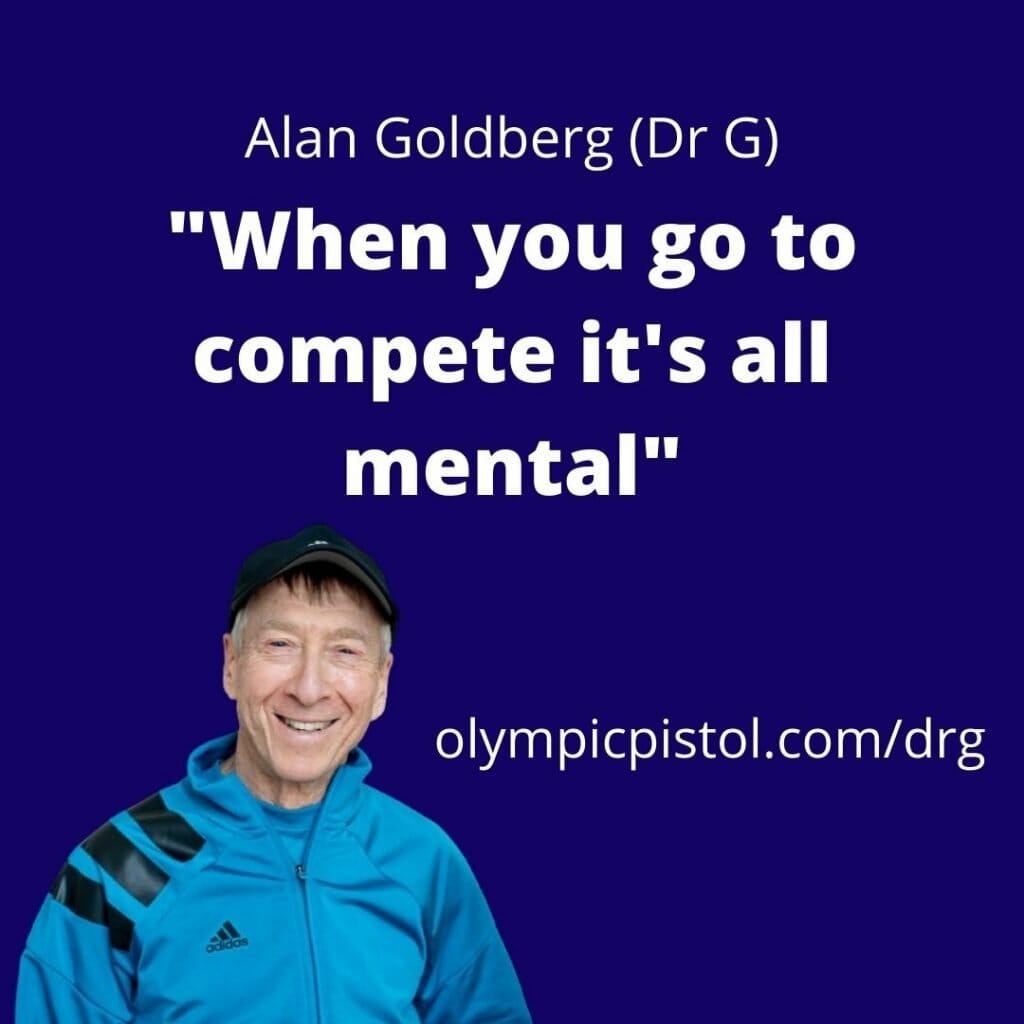
My whole philosophy in this is to normalize the mental side as just another training dimension, and in pistol, rifle and skeet it’s absolutely critical.
One of the most common performance problems I deal with, and this is a classic example of why the mental is so important, is people who do better in practice than they do in competition. Now everybody can say “well, duh, there’s more pressure in in competition”, but really people who do better in practice than they do in competition, when they’re in practice, they’re focusing on the right things: they’re not thinking, they’re not worried about outcome, if they make a mistake, if they you have a flyer shot that goes all way off, they don’t hang on to it. But then when they go into competition, if they struggle it’s because all of a sudden they’re thinking about the outcome, they’re worried about what place they’re going to come in, when they make mistakes then they hang on to them… The mental side is so critical and it’s not about having mental problems, it’s about this. It is just a very important dimension in competition and in training that gets omitted all the time. People just don’t deal with it unless they have a significant problem.
How do you train shooters and how often? What does a typical training day look like?
I do almost all of my work remotely because I have athletes all over the world that I work with. In order for me to be helpful I need to understand what they’re doing wrong from their perspective. If someone comes to me and says “I get much too nervous under pressure”, I want them to teach me- and this may sound odd- how they get nervous: when do they start to get nervous (do they start a week before the competition, do they start the night before, do they start the morning of the competition), and then how do they do it (are they talking to themselves, are they making images in their head, are they focusing on the wrong things…)
The first step in the way I work is to try to figure out how the performance problem works. First of all I want to know what part of the brain they’re in, and and what I mean by that is when we’re thinking too much we’re in our neocortex our front brain, when we perform well we’re in our hindbrain (sometimes considered to be the reptilian brain) where we’re programmed by muscle memory. Most of the time, obviously, they’re going to be overthinking in their front brain. I want to know what they’re focusing on and the first step in my helping them through this is to not only teach them the mental differences. It’s like teaching good technique: I want them to understand the difference between bad mental technique and good mental technique, and in the process of me teaching them that, I help them become aware of what they’re now doing wrong, because if you’re not aware that you’re making mistakes, if you’re not aware of what you’re focusing on and causing your nervousness, you’re doomed to continue to repeat that mistake.
You need awareness and it’s one of the key things that I teach athletes. I teach them to be aware of what part of the brain they’re in; I teach them to be aware of how to change the part of their brain; I teach them to be aware of where their focus is, because that’s a key aspect in both peak performance and problematic performance.
Awareness is the foundation of change. If you’re doing something wrong mechanically or technically and you’re not aware that you’re doing it wrong you can’t correct it. It’s the same thing mentally. I’ll teach them the difference between good performance and bad performance. I’ll teach them an awareness of what they’re doing wrong. Then I’ll teach them how to change what they’re doing wrong, how to correct the mistakes. And then, the last part of that process is testing what we’ve done out under pressure.
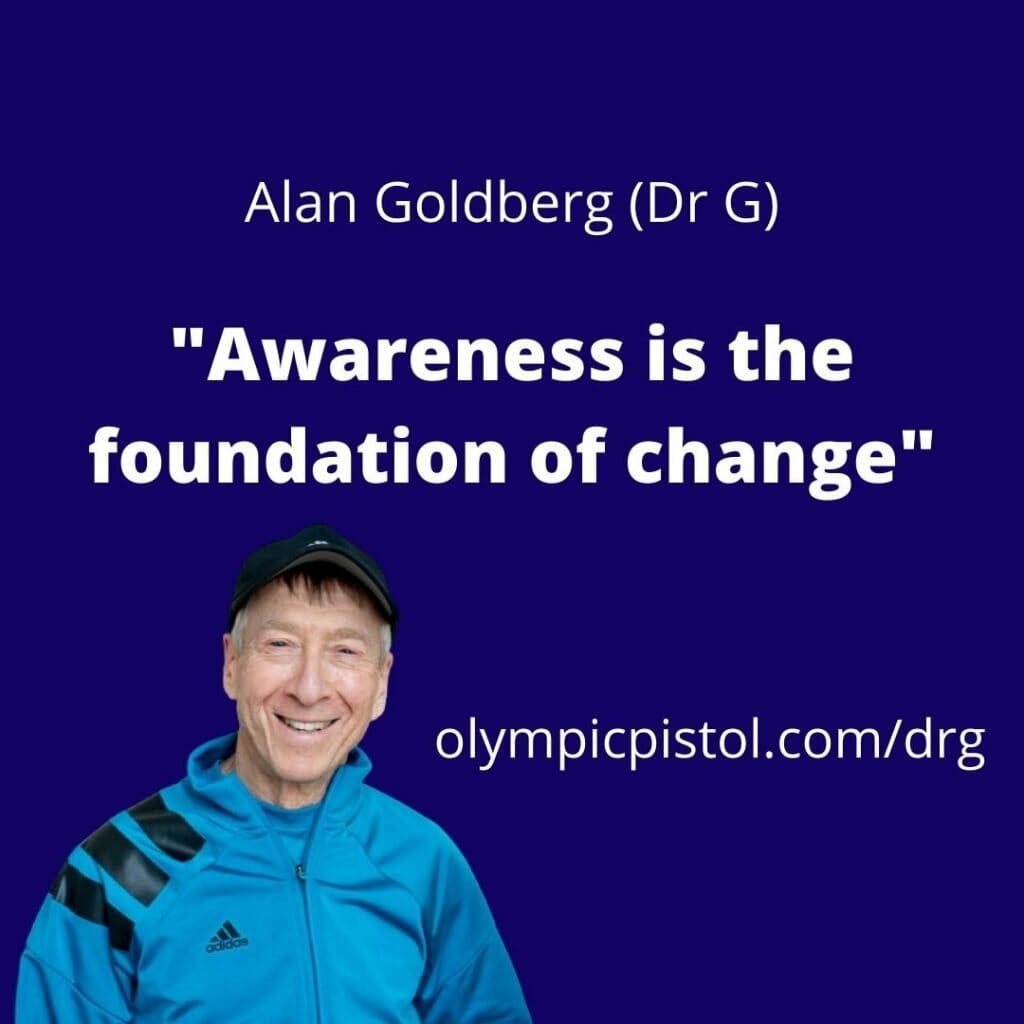
What I’m interested in when I’m working with any athlete is not making them intellectually smarter about what they’re doing wrong, because if I make them intellectually smarter but they’re still making the mistakes I haven’t done anything for them. That tends to make me anxious, the proof is in the pudding. If somebody comes to me and they fall apart under pressure and I work with them, how do we know we’re done? Because they’re no longer falling apart under pressure. They have to be able to prove to me that they can do this in pressured situations and if they’re struggling then we have to fine tune the missed pieces and we have to then go after them.
What do shooters spend a lot of effort on that is not so important?
I think they worry too much about the outcome. I would say this about a lot of athletes. They worry too much about who they’re competing against, they focus too much on the competition, and they focus too much on their score, and they do what I call crunching numbers with a running score in their heads. It’s the worst thing you can do. Performing well, shooting well… you may have your score in front of you but you have to separate, you can’t keep it in your face because that then creates internal pressure and we start trying too hard, we start tightening up and pressing and then our you know and our performance goes down the tubes as they say
How can shooters keep control of their focus and emotions under competitive pressure?
One of the lenses that I teach athletes, to understand the difference between good performance and bad performance, is the lens of the nervous system. As mammals the function of our nervous system (the brain and all of its senses) is survival, to keep us safe. When we feel unsafe our nervous system gets activated, it revs up. What’s activation? Nervousness or anxiety, frustration, anger, etc.
The danger in your sport, or any sport, for the most part it’s not physical, is emotional: it’s failing, it’s losing, it’s disappointing others, etc. If our nervous system gets too activated in response to danger, our trained skills go offline, because our self-protective motor programs kick in.
We’d all like to believe that our amazing mind controls us… No, our biology controls us as mammals. If we get too activated at some point the self-protective motor programs of fighting to protect yourself or fleeing kick in. When you’re competing you really can’t fight or flee because you’re kind of trapped, and anytime any mammal is in a situation where they don’t feel safe and they can’t fight or flee there’s a default survival option which is the freeze or immobility response, we literally shut down: we can’t think straight, we keep making stupid mistakes, and we don’t have access to our skills.
So what I do with athletes is teach them how to recognize the early signs that their system is beginning to rev up. What are the signs that you’re getting activated? Well there’s the physiological signs: heart rate, breathing muscles, tightening. And there are also the mental signs, so when I start getting activated and getting nervous my mind’s gonna race, I’m going to focus on the outcome, I’m going to worry about other competitors, I’m going to hang on to my mistakes, what happens to me emotionally.
Activation is key in any fine motor sport. Someone playing either european football or american football can get really pumped up and really activated and it won’t affect their performance. In a fine motor sport if you get a little activated that can affect your performance negatively. With all shooters across the board- whether we’re talking about archery, pistol, skeet…- I really try to get them to be aware of when their system’s revving up, the early signs of it, and then how to ride the wave of the activation so it comes down, because we don’t want the wave to take us up into shutting down, into overwhelm.
What’s your advice on building self esteem? How can shooters build confidence when results are not good and doubt creeps in?
I go back here to concentration. What we focus on before and during the match is going to impact how confident we feel. If I focus on the wrong things, if I focus too much on how good the competition is, I’m going to lose my confidence. If I focus too much on my score and needing to place, I’m going to lose my confidence. So it becomes a question of learning how to control where you put your focus.
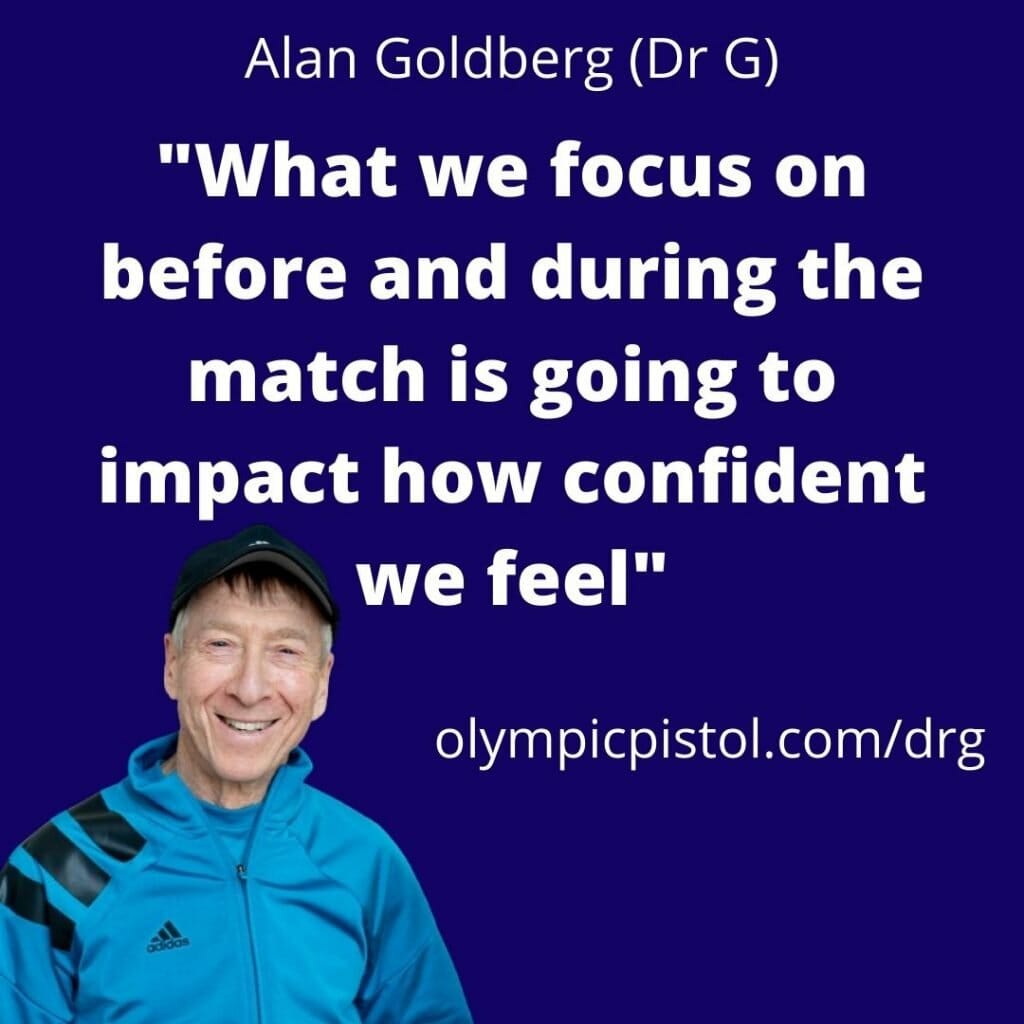
The whole thing about last minute negative thinking and doubts is pretty normal. I think a lot of athletes misunderstand it. People think that you have to be positive and confident in order to shoot well. I’m into positive thinking, that’s nice, but that doesn’t prevent you under pressure from having negative thoughts pop up. A lot of people in my field will teach positive thinking and thought-stopping techniques and things like that, and when push comes to shove you can practice that stuff, but when you’re under pressure that doesn’t mean you still won’t have negative thoughts coming in. They’re absolutely normal and the trick with negative thinking is not to try to fight with it, push it away or to try to be positive. When negative thoughts come up that’s just a sign your system is revving up and your job is to let the negative thought go.
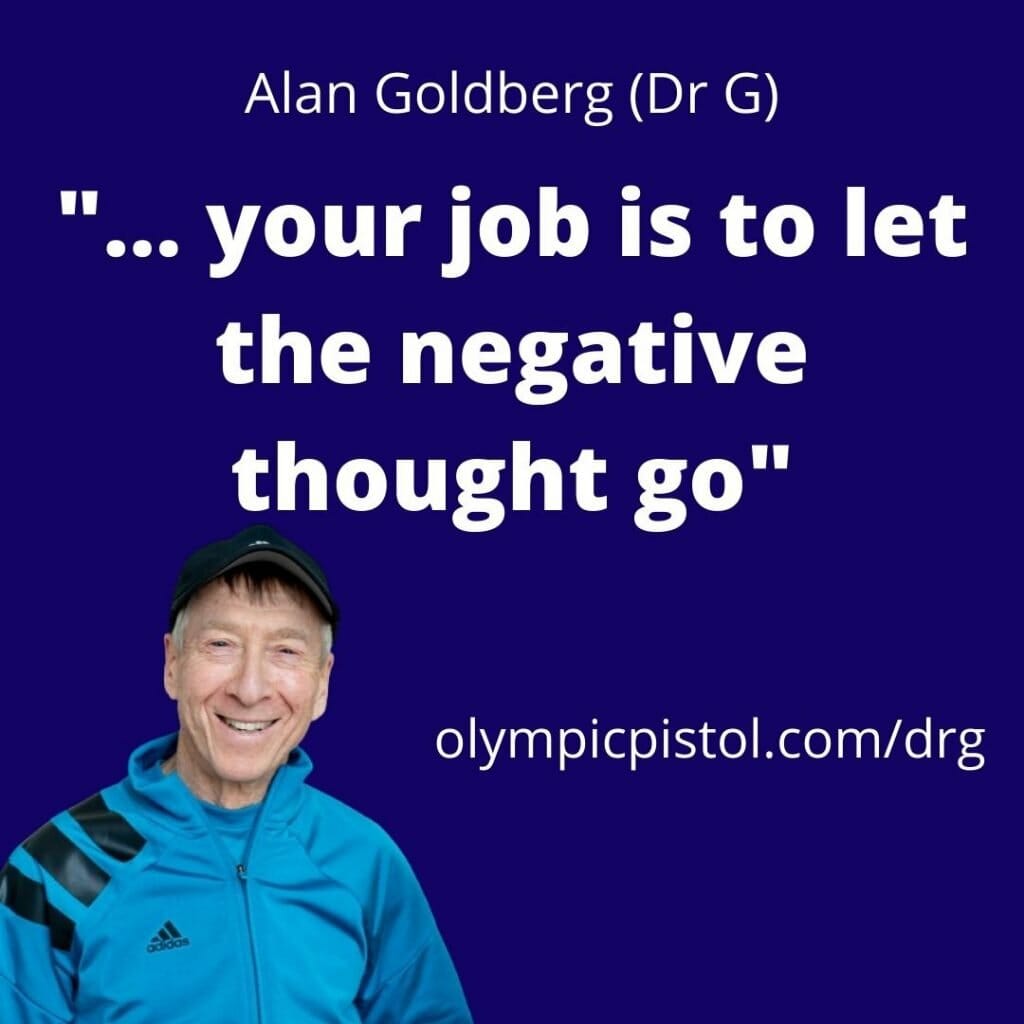
Most of us when a negative thought goes by we grab it, we bring it down and we engage it. And we believe it, we believe our thoughts. Our thoughts are not accurate. The skill that I teach people is to have a neutral response when a negative thought goes by and to refocus on the task at hand.
There are two general places any shooter or any athlete can put their concentration, like in a crossroad: I can have an internal focus when I’m shooting, on my thoughts, so I can focus on a flyer or the outcome. Any time an athlete focuses on their thinking they leave their body, they tighten up, and they lose control.
The other place I can put my focus on is on the feel of what I’m doing, and not “I feel good, I feel bad, I feel really on today…” That’s thinking. It’s going through my shot plan and feeling every aspect of it not not instructing myself not talking to myself about it but actually feeling it. So if at some point in my shop plan there’s a breath that I take, when I take that breath I want to do it with awareness, I want to feel the breath come in, I want to feel the breath go out. If I focus on what I’m doing, the feel of what I’m doing, then I’m going to stay calm, I’m going to stay confident, and I will have access to my skills. If I focus on my thinking about what I’m doing I’m going to get nervous and tighten up, lose my confidence, and lose access to my skills.
How do you practice this focus?
We learn in anything first when we’re in a situation where we’re not under stress. You can’t learn to stay calm under pressure when you’re under pressure, that’s not the time to learn. The time to learn is when there’s no pressure. And yes you need to practice that shot process, that shot plan, and you need to practice doing it with awareness, so that as you go through each step physically you’re focusing on the feeling of doing it okay, and that will then translate when you get into competition.
How do you keep shooters motivated in training and competition?
The heart of motivation is having a dream, having a goal, something that you really want to accomplish. Most athletes don’t understand how to use their goals. Your goal- or what I call your big enough why, having a dream- serves one purpose in training: to motivate you right now, today, to work hard. We want athletes using their goals in this sentence: how is what I’m doing right now going to help me get to where I want to go. But what most people do with their goals is to use them as sticks to beat themselves up in practice if they’re not performing well: “if I do this in this upcoming competition there’s no way I’m going to reach my goals”. Wrong! The only purpose of a goal in practice is to get me to work harder right now, to get me to focus. And the other mistake people make is to bring their outcome goals with them into competition. That is a huge mental mistake, because we cannot perform well when we’re making something that important, when we’re bringing our goals with us, and that’s what goals do. If I go to the line and I bring my goals with me, I’m making what I’m doing far too important. That’s going to create stress and then I won’t do well
What do you make your shooters do before a match or training to get into the appropriate mind space?
That’s an individual thing. For some people it’s very important that they calm themselves down, and they might do relaxation techniques, and they might go off by themselves, and that helps, that calms them down, that works for them. For other athletes, if they go off by themselves then they have a lot of time to think and they end up thinking about how important the match is, they end up freaking themselves out. I want athletes to distract themselves, to watch movies, read books, talk to friends, but nothing that’s related to the competition.
Which tool or equipment can’t you live without as a coach?
Listening. The only way I know what to do, accurately (and I would say this for any coach) is that you have to pay very close attention to what the shooter is presenting to you: how they’re describing the problem, what it looks like, what it sounds like… Because that gives me information, it gives me a direction to go in. When I first started this work I had a series of things I would teach people, and I would teach everybody the same same stuff over and over again. But it needs to be hand tailored. Really good coaches understand communication is a two-way street. A lot of coaches are in the headset “I talk, you listen”. It’s not how it works. I talk, then I listen to how you respond, and then I might say something else. The way I look at it is the people I work with are the car and I’m the hitch, I’m the u-haul, I follow them rather than me taking the lead.
What question would you have liked me to ask and what’s your answer to it?
God, I don’t know, you’ve asked a lot of good questions already… I think you already asked it. The question is sort of like what is the biggest cause of performance problems and how do you correct it, and the biggest cause of performance problems is really where somebody puts their focus before and during competition, and you correct it by learning where your focus needs to go, where you have it right now that’s wrong, and how to change it.
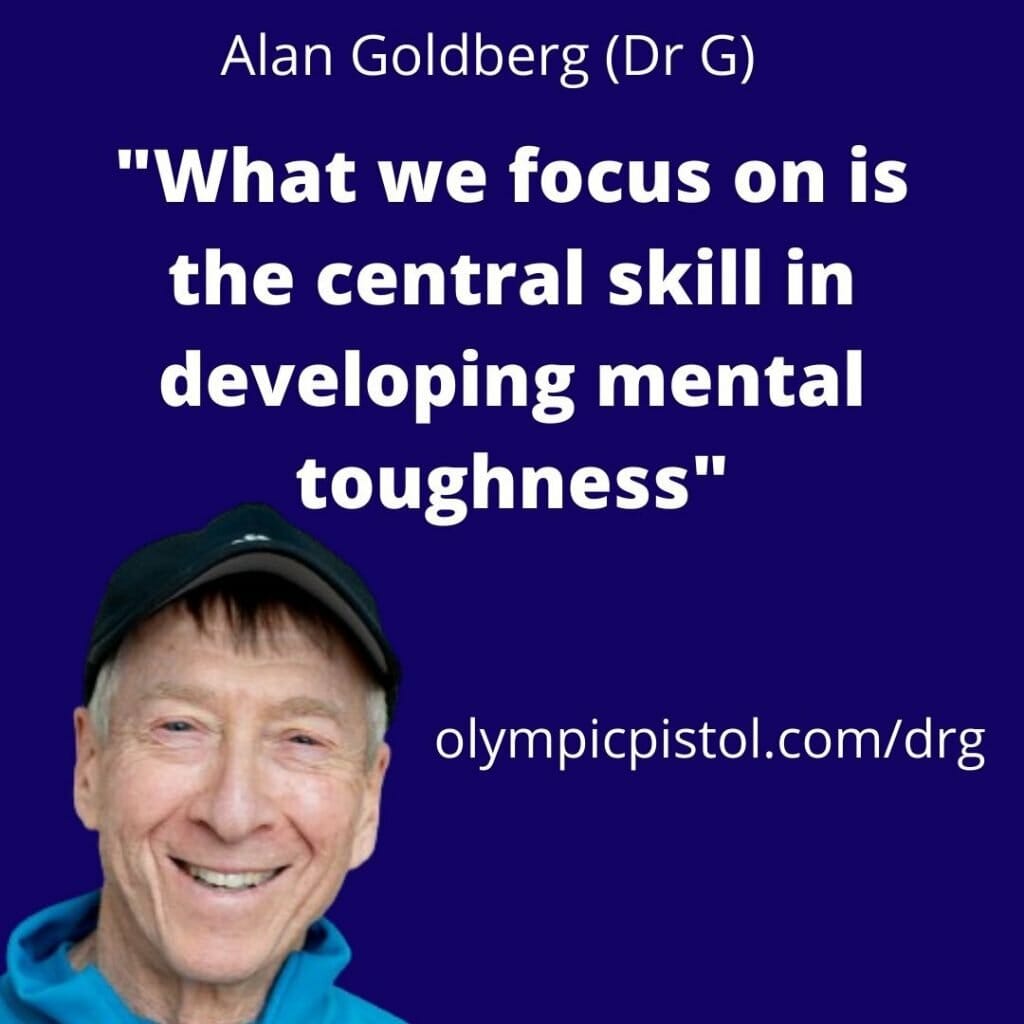
What we focus on is the central skill in developing mental toughness. You want to be able to focus on what’s important and let go of everything else, be aware the minute I lose my focus and then bring myself back. Concentration is having the ability to recognize when you drift and to come back. What hurts us as athletes isn’t that we lose our focus, that’s normal, what hurts this is to lose focus and not coming back right away.
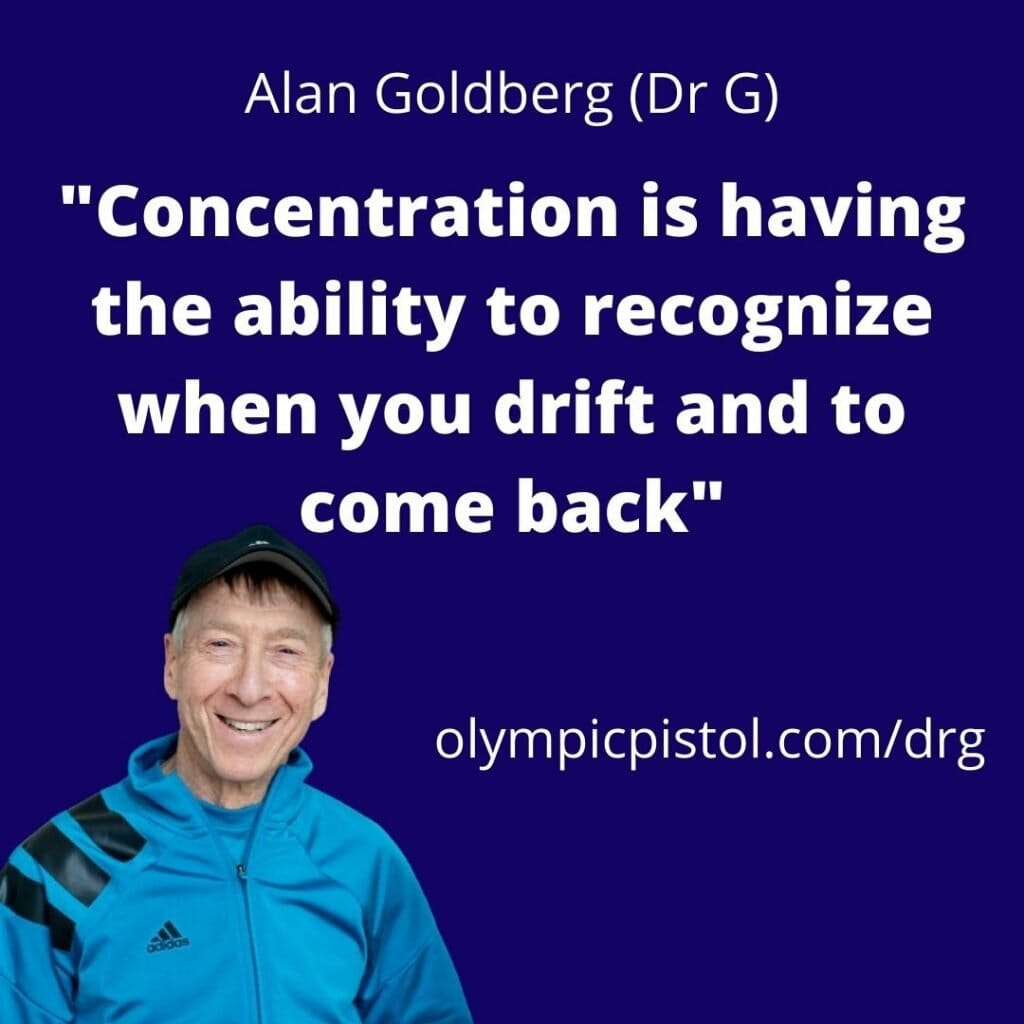
Every shot you take when you’re not focusing on the right stuff is an inaccurate shot, and every shot like that is going to erode your confidence. You have to have the ability to be aware the minute your focus leaves where it’s supposed to be- which is on what you’re doing, the action, the feel of what you’re doing- and you need to be able to bring yourself back. The distractions are usually thoughts. For concentration we have to learn to have a neutral response to negative thinking, because you can have the performance of your life even when you’re flooded with doubts and negative thoughts. The trick is not to listen to negative thoughts, they’re normal. If I’m focusing on what I’m doing right now and a negative thought pops up and at some point it’s right in front of me, what I’m going to do what I’ve trained myself to do, is to let it go. What everyone else is to follow the negative thought and they get lost.
How can people learn more about you and from you? (coaching, site, youtube, books…)
You can go to my website which is competitivedge.com. I have a lot of free ressources there. I’m also sharing on YouTube, Instagram, Facebook, Twitter… I have a lot of training material that I’ve put together over the years, audio material, that can be downloaded, and also books and PDF. My newest program is Performing like a champion, from performance blocks to performance breakthroughs, and it combines the things I’ve talked about: surface skills, concentration, staying calm under pressure, dealing with negative thinking… It combines that with a nervous system approach. If you’re serious about your sport and you want to excel you cannot afford to ignore this part of your performance, because if you do you’ll be great in practice and then you’ll be erratic and inconsistent in competition. If you want to be serious you want to go far in this sport you have to work on this, it is a key dimension in performance.
Dr G’s Mental Tips for Target Sports
How to avoid chocking
Your Concentration Can Make Or Break Your Performance: A Former World Champion’s Story
Who would you recommend is interviewed next?
If you want someone else that is in this field there’s a colleague of mine by the name of Jerry Lynch, who is in Santa Cruz, California. He’s been doing this work a lot, probably even a little bit longer than I have. He’s very good. He does a lot of work with teams.
